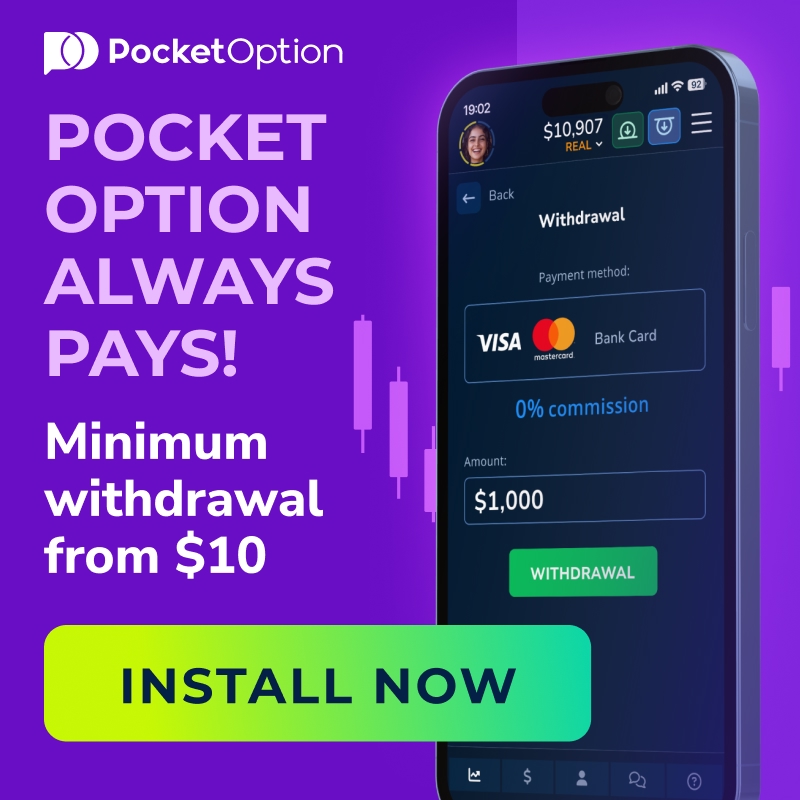
7 minute read
Is Pocket Option Available in Netherlands? Broker Review
Yes, Pocket Option is available for traders in the Netherlands. Dutch residents can register, deposit, and trade on the Pocket Option platform without any legal restrictions at the time of writing. However, before you jump in, there are important factors to consider — including regulatory status, legal risks, alternatives, and how to trade responsibly within the country.
In this article, we’ll explore everything you need to know about using Pocket Option in the Netherlands, including its legal standing, features, risks, and safer alternatives.

💥 Trade with Pocket Option now: Open An Account or Visit Brokers 👈
What Is Pocket Option?
Pocket Option is an international binary options trading platform launched in 2017 by Gembell Limited. It offers users the ability to speculate on the price movements of various assets such as forex, cryptocurrencies, stocks, and commodities — usually in very short timeframes, often 60 seconds or less.
The platform is best known for:
Simple interface and fast trade execution
High payouts (up to 92% return on successful trades)
Social trading features
Demo accounts with virtual funds
Low minimum deposits (as low as $5)
Pocket Option has gained popularity worldwide, especially among beginners looking for quick-profit opportunities in trading.
Can You Legally Use Pocket Option in the Netherlands?
Yes — but with caveats.
As of now, Dutch citizens are not restricted from accessing Pocket Option. The platform is not explicitly banned in the Netherlands, and traders can register and use it freely. However, there are two major considerations:
Pocket Option is not licensed by the Netherlands Authority for the Financial Markets (AFM) – the regulatory body responsible for supervising the financial markets in the Netherlands.
Binary options are heavily restricted in the EU under ESMA regulations (European Securities and Markets Authority), which prohibit the marketing, distribution, and sale of binary options to retail investors within the EU.
So how is Pocket Option still accessible?
Because Pocket Option is offshore-registered, it operates outside EU regulations. It is regulated by the IFMRRC (International Financial Market Relations Regulation Center) – a non-governmental, non-EU regulator. This allows Dutch users to access the platform at their own risk, even though such trading products are not permitted by licensed EU brokers.
Summary:
✅ You can access and trade on Pocket Option from the Netherlands
⚠️ It’s not licensed or recognized by the Dutch or EU regulators
🚫 Binary options are banned for retail investors under EU rules — but offshore platforms can still operate
Is It Safe to Trade on Pocket Option in the Netherlands?
Safety depends on your understanding of the risks.
Here are a few critical points:
1. Lack of Regulatory Protection
Because Pocket Option is not regulated by AFM or other EU authorities, you’re not protected by EU investor compensation schemes. If the platform freezes your account, delays your withdrawal, or shuts down, there may be no legal recourse in Dutch courts.
2. Binary Options Are High Risk
Binary options trading is very speculative. You either win a fixed payout or lose your entire stake within minutes. This is essentially a high-speed betting format, which is why ESMA banned it for retail users in the EU.
3. Scams and Misleading Promotions
Offshore platforms like Pocket Option are often promoted by affiliate marketers using fake earnings screenshots, social media hype, or misleading tutorials. Always be cautious and do your own research.

💥 Trade with Pocket Option now: Open An Account or Visit Brokers 👈
Should You Use Pocket Option in the Netherlands?
Whether you should use it depends on your goals and risk tolerance.
You might consider Pocket Option if:
You understand that binary options are speculative and risky
You’re comfortable trading without EU regulatory protection
You’re using a demo account to practice and learn about short-term market movements
You want to experiment with low-stakes trading (minimum $1 per trade)
You should avoid Pocket Option if:
You’re new to investing and believe binary options are a quick way to get rich
You’re not fully aware of the risks involved
You prefer regulated brokers with Dutch or EU licenses
You plan to invest significant sums of money
Better Alternatives to Pocket Option for Dutch Traders
If you're looking for regulated and safer ways to trade or invest from the Netherlands, consider the following alternatives:
1. eToro
✅ Registered with CySEC and authorized to operate in the Netherlands
✅ Offers stocks, ETFs, crypto, and CFD trading
✅ User-friendly interface and social trading features
❌ Doesn’t offer binary options
2. DEGIRO
✅ Netherlands-based broker regulated by AFM
✅ Offers low-cost access to global stocks, ETFs, and bonds
✅ Ideal for long-term investors
❌ No binary options or leverage trading
3. Plus500
✅ Regulated by the FCA and CySEC, with EU passporting
✅ Offers CFDs on forex, crypto, indices, etc.
✅ Licensed for Dutch users
❌ No binary options
These platforms offer a legally compliant, safer way to speculate or invest, with proper risk controls and access to EU investor protections.
How to Use Pocket Option in the Netherlands (If You Still Want To)
If you understand the risks and still want to use Pocket Option, here’s a quick step-by-step guide:
Step 1: Register
Go to Pocket Option’s official website 👈 and sign up with your email or social account.
Step 2: Demo Account
Start with a demo account. It offers $10,000 in virtual funds and allows you to learn the platform with zero risk.
Step 3: Deposit
Minimum deposit is $5. You can use payment methods like credit cards, cryptocurrencies, and e-wallets (Netherlands-supported).
Step 4: Trade
Select an asset (e.g., EUR/USD), choose an amount, set the time (e.g., 60 seconds), and predict whether the price will go up or down.
Step 5: Withdraw
Minimum withdrawal is $10. It typically takes 1–3 business days, depending on the method.
Important Tip: Never invest more than you can afford to lose. Consider this platform for entertainment or learning purposes — not serious investing.
Final Verdict: Is Pocket Option Worth It for Dutch Traders?
Yes, Pocket Option is accessible from the Netherlands, but that doesn’t mean it’s the best or safest choice.
While you can legally use the platform, it falls outside EU financial regulations. That means no local protections, no legal guarantees, and high-risk products that are banned for good reasons. If you're simply curious and want to experiment with a small amount or demo trading, Pocket Option can be an educational tool. But for serious trading or long-term investing, it’s wiser to stick with regulated platforms.
FAQs: Pocket Option Netherlands
❓ Is Pocket Option legal in the Netherlands?
Yes, but it’s not licensed by Dutch regulators. Use it at your own risk.
❓ Can I withdraw money from Pocket Option in the Netherlands?
Yes, withdrawals are available via several methods. However, always start with small amounts to test the reliability.
❓ Is binary options trading legal in the EU?
Binary options are banned for retail traders in the EU under ESMA rules. Offshore platforms like Pocket Option bypass this restriction, but that doesn't make them safer.
❓ What’s the best alternative to Pocket Option for Dutch users?
eToro and DEGIRO are regulated and popular among Dutch investors. They don't offer binary options, but they do provide safer trading environments.
Final Thoughts
If you're in the Netherlands and curious about Pocket Option, approach it with realistic expectations and a strong understanding of the risks involved. While it's accessible, it's not regulated locally, and the trading model is inherently volatile.
Use the demo mode, never trade money you can’t afford to lose, and explore better-regulated platforms for more sustainable investment opportunities.
💥 Trade with Pocket Option now: Open An Account or Visit Brokers 👈
Read more:



